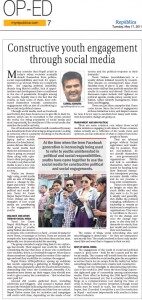(to mark the International Human Rights Day)
How you feel if someone says: “Eat as much as you can (before the food is ready)” and when the food is ready, you are told: “That’s enough: you are eating too much.”
That’s exactly what is happening with our rights to freedom of expression and opinion!
Citizens around the world living in democratic countries were guaranteed rights to freedom of expression for long. The Universal Declaration of Human Rights, promulgated long ago in 1948 by UN General Assembly, has explicitly stated it in Article 19.
All democratic nations around the world have copied, rephrased/translated and pasted the text in their constitutions. As citizens we’ll thought well we’ve individually rights to freedom of expression and opinion.
We didn’t have a powerful medium through which we could effectively exercise the rights and we were made to believe media is mediating the rights on behalf of us.
But we are being deceived!
The Internet emerged as a powerful medium that every individual around the world could use to exercise the rights to freedom of expression and opinion. When blogging emerged, it was evident. If blogs were difficult to set up and continued, then social media (on internet) is the easiest tool to use to express ourselves. Continue reading…



